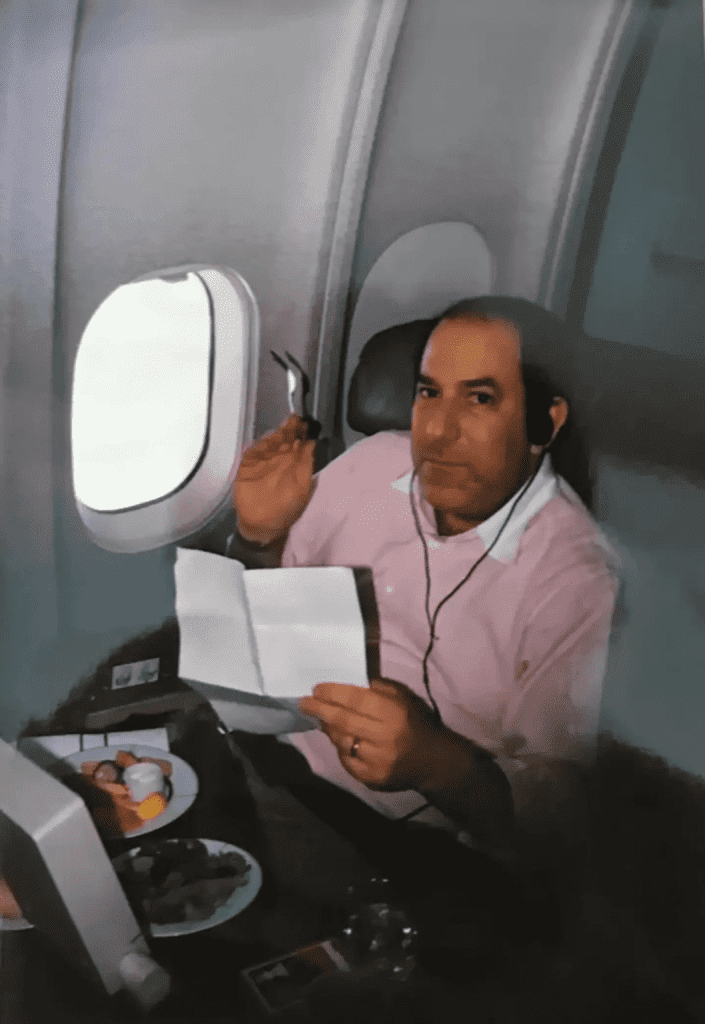Imagine having a lifetime pass to fly first class anywhere in the world. Sounds like a dream, right? That was the reality for Steven Rothstein, who acquired one of American Airlines’ coveted “AAirpass” tickets in the 1980s. However, this dream turned into a nightmare for the airline, as Rothstein’s frequent flying led to staggering losses—$21 million to be exact. Eventually, the airline revoked his pass, claiming he abused the privilege. Here’s the intriguing story of how one man managed to outsmart the airline’s system, only to face the consequences later.

The Creation of the AAirpass: A Bold Business Move
In 1981, American Airlines launched an audacious marketing strategy called the “AAirpass.” For a one-time fee of $250,000, customers could purchase a lifetime first-class ticket, enabling unlimited flights for life. The concept was simple: customers could travel anywhere, anytime, in the luxury of first class. The offer was designed to secure immediate capital for the airline during a financial downturn and appealed to avid travelers.
As time passed, the AAirpass ticket became a premium status symbol. But by 1993, the price had skyrocketed to $1.1 million, reflecting the immense value of unlimited travel. Over time, American Airlines sold a total of 66 lifetime tickets. While this strategy initially seemed brilliant, it quickly spiraled into a financial disaster.
Meet Steven Rothstein: The Frequent Flyer Who Took Full Advantage
One of the 66 people to acquire this golden ticket was Steven Rothstein, a businessman from Chicago. At 37, he bought the AAirpass for $250,000, along with a $150,000 “companion pass,” which allowed him to bring a guest on any flight. Rothstein saw the AAirpass as an opportunity not only for business travel but also for personal enjoyment. For over two decades, he flew first class to various destinations around the globe.
During his 27-year flying spree, Rothstein amassed 30 million miles across 10,000 flights, making him a true jet-setter. He wasn’t just traveling for himself—he often booked flights for friends, family, and even strangers. With the companion pass in hand, Rothstein would often bring along someone in need, whether it was a friend attending a funeral or someone visiting a sick relative. His generosity, however, came with significant costs for American Airlines.
The Financial Fallout: $21 Million in Losses
Rothstein’s extensive flying habits led to severe financial repercussions for the airline. By 2008, American Airlines’ “revenue integrity team” began to scrutinize the AAirpass program, which had become virtually unprofitable. Rothstein’s flights alone had cost the airline an estimated $21 million—nearly 84 times the original price of his pass.
His frequent travel wasn’t just a minor inconvenience for the airline; it represented a colossal financial miscalculation. The AAirpass program, initially meant to be a revenue booster, had backfired. With Rothstein’s usage pushing the program to the brink, American Airlines knew they needed to take action.

American Airlines regretted giving a lifetime pass to one particular man. Credit: Joe Raedle/Getty
The Cancellation of Rothstein’s AAirpass: A Controversial Decision
In 2008, American Airlines made a dramatic decision: they canceled Rothstein’s AAirpass, citing fraud and abuse of the system. This cancellation was not only a financial decision but also a legal one. The airline accused Rothstein of engaging in fraudulent activities, including lending his pass to others and booking flights without any intention of showing up. These tactics, according to American Airlines, violated the terms of the AAirpass agreement.
Rothstein was left shocked, and the cancellation had immediate consequences—he was stranded in Bosnia during one of his trips. American Airlines also pursued legal action against him, claiming damages due to the alleged misuse of the pass. Rothstein, however, argued that he never intended to violate the rules. He admitted to booking flights he wasn’t sure he would use but maintained that his understanding of “fraudulent behavior” was limited to lending the pass to someone else, which he denied doing.
Rothstein’s Response: “Good Deeds, Not Fraud”
In his defense, Rothstein explained that his intentions were purely altruistic. He described how he often used the pass to help others in need. “I gave a man in Seattle a ticket to go to his father’s funeral,” Rothstein told Forbes in 2019. “I gave many people tickets to visit ill family members. I don’t view that as philanthropy; I view that as good deeds.”
Steven Rothstein ! pic.twitter.com/F8Aa06PJmS
— Johnny Midnight ⚡️ (@its_The_Dr) October 13, 2024
Rothstein’s daughter, Caroline, also defended her father, writing in The Guardian that the airline’s accusations were exaggerated. “Dad admits he booked seats he wasn’t sure he, or his companions, would ultimately use. But that’s not uncommon, and he never understood it to be against the rules,” she wrote. She added that all reservations were booked by American Airlines employees, further complicating the fraud allegations.
American Airlines’ Response: Damage Control and Lessons Learned
American Airlines managed to settle the dispute with Rothstein outside of court. The airline faced public scrutiny for revoking Rothstein’s AAirpass, a decision seen by some as an attempt to cut costs at the expense of customer loyalty. However, from a business standpoint, American Airlines’ move was seen as necessary to curb massive financial losses.
The AAirpass program has since become a cautionary tale in the airline industry. What began as a creative marketing ploy to boost cash flow ultimately resulted in millions of dollars in losses. The case of Rothstein highlighted the risks of offering unlimited services without proper safeguards, leading many airlines to rethink their loyalty programs.
Conclusion: The Unintended Consequences of a Lifetime Pass

The airline originally introduced the ‘AAirpass’ due to financial struggles. Credit: Robert Alexander/Getty
The story of Steven Rothstein and his lifetime AAirpass is a fascinating example of how even the most well-intentioned business ideas can go awry. While the concept of a lifetime first-class ticket seemed like an enticing offer, its execution was flawed. Rothstein’s relentless pursuit of maximizing the pass’s value, coupled with American Airlines’ underestimation of its financial impact, created an extraordinary situation that continues to be a topic of discussion in business and aviation circles.
The tale serves as a reminder that every privilege comes with limits—even if they aren’t initially clear. For Rothstein, what started as an opportunity for unlimited travel turned into a story of legal battles and public scrutiny. And for American Airlines, it was a lesson in balancing customer satisfaction with financial sustainability.


